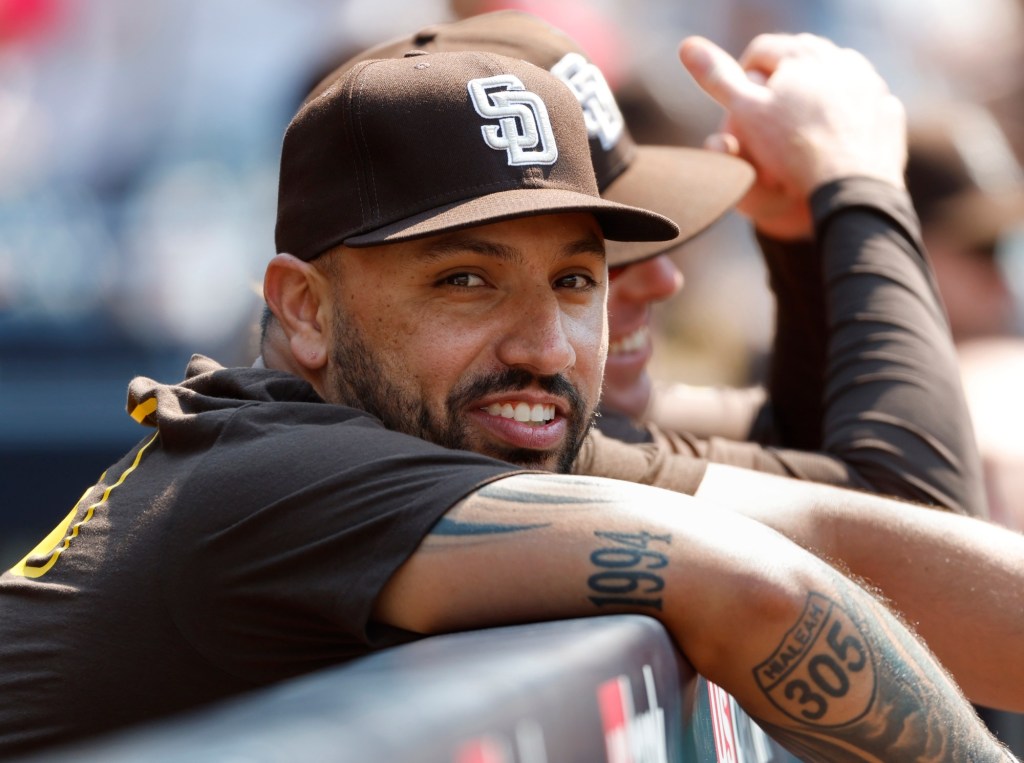The Padres traded for left-hander Nestor Cortes at the deadline, sending outfielder Brandon Lockridge to Milwaukee in exchange for Cortes, minor leaguer Jorge Quintana and cash considerations.
Cortes was drafted by the New York Yankees in the 36th round of the 2013 draft and excelled in the minors for five years before being selected by the Baltimore Orioles in the Rule 5 Draft. After struggling in four major league appearances, he was returned to New York. The Yankees then dealt him to the Seattle Mariners, who released him after one season. Cortes rejoined the Yankees for a third stint and shined. After a breakout season in 2021, he was named an All-Star in 2022 and pitched in the World Series in 2024. Nicknamed “Nasty Nestor” and “The Hialeah Kid,” Cortes is known for his pitching savvy and deceptive delivery.
The Union-Tribune talked to Cortes about his road to the big leagues, love of fishing and becoming a first-time father. This interview has been edited for length and clarity.
You went to Hialeah High School in South Florida. That’s not the same high school that Manny Machado went to, but it’s the same area. Did you guys have a relationship?
A: So, no. He was a senior when I was a freshman in high school, but I do remember him. We were playing at the same field, just at different times. … Fast forward to 2018 and we’re teammates with the Orioles, so that was pretty cool. And in the (2022) All-Star Game, we saw each other in center field in Los Angeles and he was just screaming ‘Hialeah, Hialeah, Hialeah!’ and I look up and it’s Manny. He was happy for me, because he saw what I went through in 2018 with the Orioles.
That area has a strong Latin American presence. It’s also known for producing a lot of baseball talent. Did you feel a sense of community growing up there?
A: Definitely. I think South Florida is unique. Just a lot of resilient people. Most of it is Cubans that come from Cuba. They came to the States to look for a better life. But those guys, everybody just had to find a way to survive. I think what makes Miami and South Florida special is that you kind of have that same mentality, almost of survive, survive, survive. … The Miami area is a really competitive place, not only in baseball, but in every other aspect of jobs, living, the whole thing.
You were born in Cuba and came to the U.S. as a baby after your father won the visa lottery. Your dad was incarcerated for a year before you were born after he was caught trying to defect. Do you ever reflect on that experience, or consider how different your life might have been if he hadn’t won the lottery?
A: As far as how my life would be different if my dad didn’t win the visa lottery, I can see myself defecting from Cuba and going through those tough paths that 95% of all the other Cubans go through. … So they give out (a small number) of visa lotteries a year, but not everybody’s able to come. You still need plane ticket money. You need somewhere to live when you get here. A lot of obstacles to just get the opportunity to come here. Luckily, I had an aunt — my dad’s sister — already living here for a few years, so we were able to go to her house for a few months until we got our feet under us and my dad found a job, and we were able to move out and create a life of our own. But my mom was 19 and my dad was 25. So imagine, my mom was basically a baby still, trying to take care of a baby in a place where she didn’t know the language and didn’t know what to do. So a lot of props to them. Obviously they were resilient … (They) sacrificed their whole life just to give me a better life.
You were drafted by the Yankees and performed well in their minor league system. Then the Orioles selected you in the Rule 5 Draft. Did that turn of events surprise you?
A: I was so surprised. So after five years, the Yankees had to protect me. They felt like I wasn’t good enough to be protected. The Orioles picked me in the Rule 5 Draft. I was super excited. I was like, ‘OK, now what?’ because I was so naive to all these things. So 2018, I go into spring training, they said, ‘Hey, we’re gonna work you as a starter. You’re gonna fight for the fifth spot.’ I was a starter in the minor leagues. Then they signed other starters, so I ended up going into the long relief role in the bullpen. And I (made my debut) and had the worst two weeks of my big-league career to start off my big-league career. I got designated for assignment after just two weeks. I had just gotten my first paycheck. I’m like, ‘Wow, this is what it looks like to be in the big leagues.’
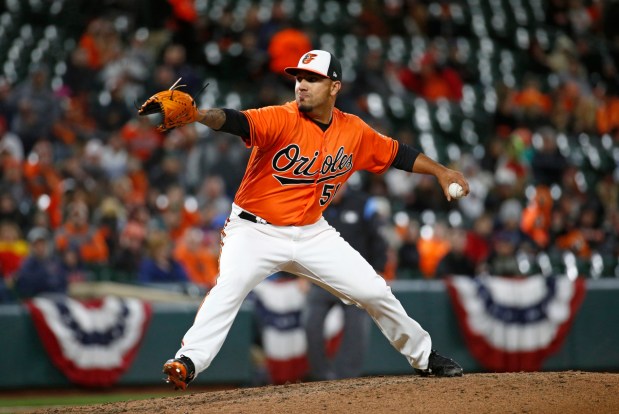 Baltimore Orioles relief pitcher Nestor Cortes Jr. throws to the Minnesota Twins in the seventh inning of a baseball game, Saturday, March 31, 2018, in Baltimore. It was his major league baseball debut. (AP Photo/Patrick Semansky)
Baltimore Orioles relief pitcher Nestor Cortes Jr. throws to the Minnesota Twins in the seventh inning of a baseball game, Saturday, March 31, 2018, in Baltimore. It was his major league baseball debut. (AP Photo/Patrick Semansky)
You were gone after only four appearances. That had to have been so mentally taxing.
A: It was so bad. At the time, I think the Orioles didn’t realize how their season was going to turn out. So to be fair, I did deserve to be DFA’d.
But you’re also just finding your way as a major leaguer. And then the Orioles finished 47-115 that year.
A: Yes. Everybody (on the Orioles) gets traded. Now they’re the worst team in the big leagues. I told myself, ‘Wow, I just got DFA’d from the worst team in the big leagues.’ The Yankees got me back, so I go (from the worst team) to one of the best, top five in the big leagues. I said, ‘I’m never going to make it up again.’ That’s what my mentality was.
The Yankees then traded you to the Mariners for $28,300. Things didn’t go well with Seattle either. Did you think, ‘Hey, do I stay in baseball? Do I leave baseball?’
A: No. Even in the minor leagues, I saw a lot of high prospects say, ‘If I don’t get moved up to Double-A, I’m going home.’ I always told myself in that moment, ‘I’ve been playing baseball since I was 4 years old. I have nothing to fall back on.’ I wasn’t a big-signing bonus baby. If I’m packing my bags, I’m gonna go work at Walmart or something, because I don’t have nothing else to do. So I’m like, ‘I’m gonna play until they rip the jersey off my back.’ Luckily, it worked out a little bit.
In 2020, you go back to the Yankees for your third stint with New York. But this time, it clicks. 2021 was a breakout year for you and in 2022, you make the All-Star Game. How validating was that?
A: I felt like 2018, ‘19, and ‘20 were a big learning process for me. When I got to the big leagues, I didn’t really have a routine. I don’t know how to be a big-leaguer. So 2018-20 kind of shaped me, helped me. It was like, ‘Hey, what you’re doing is not enough. You’ve got to do more, or you’ve got to change up certain things that you’re doing.’ … So in ’21, I pitched one or two months in the minor leagues and I get called up. And I said, ‘I gotta really concentrate, I need to be professional.’ Like hydration, sleep, recovery, all these things.
One starting pitcher gets COVID, you get an opportunity. Then more opportunities follow, and you keep meeting the moment.
A: I’m like, ‘Man, I could get used to this.’ (laughs) I was able to finish that year as a starter. … But even after ’22, I’m like, ‘OK, I know I just made the All-Star Game, but I still feel like I’m not established.’ Which was a good mentality to have, because you always need to be working and you always need to make yourself better than what you are. The league adjusts. You see it every day. The league adjusts to the pitcher, the pitcher adjusts to the hitter, and the guys that don’t adjust get moved out of this game. And that kind of mentality helped me. ‘OK, how do I get better? How can I stay this good?’ And it’s allowed me to be successful.
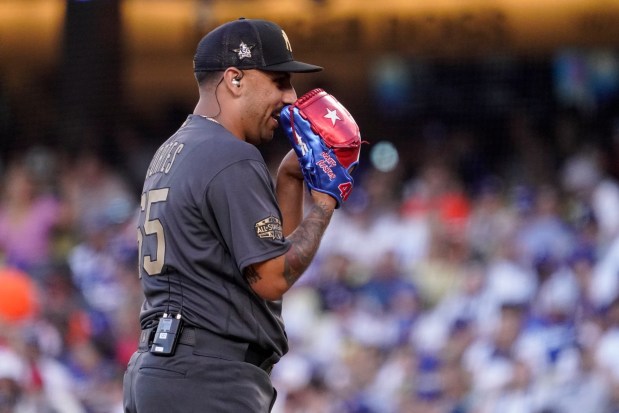 American League pitcher Nestor Cortes, of the New York Yankees, uses an earpiece and microphone to talk to his battery mate catcher Jose Trevino, also of the Yankees, betfore throwing a pitch to the National League during the sixth inning of the MLB All-Star baseball game, Tuesday, July 19, 2022, in Los Angeles. (AP Photo/Mark J. Terrill)
American League pitcher Nestor Cortes, of the New York Yankees, uses an earpiece and microphone to talk to his battery mate catcher Jose Trevino, also of the Yankees, betfore throwing a pitch to the National League during the sixth inning of the MLB All-Star baseball game, Tuesday, July 19, 2022, in Los Angeles. (AP Photo/Mark J. Terrill)
How did growing up personally and professionally in New York — the biggest stage, with some of the most ruthless fans and media — shape you?
A: It’s tough, because obviously you get penalized every single time you don’t do well. But I think it brings the best out of you every single day as a competitor. Not only is your team counting on you, not only is your manager counting on you, not only is your front office counting on you, but the whole state of New York, right? And if you play for New York, that means you probably have fans in Italy, you probably have fans in Europe. It’s a worldwide brand. Mentally, you get drained. But I think it’s a good type. Like, you’ve got to survive somehow. You don’t know how you’re gonna survive, but you gotta figure it out. And I think that’s what makes New York great, that’s what they’re all for there. It definitely helped me to be in the fire every single time.”
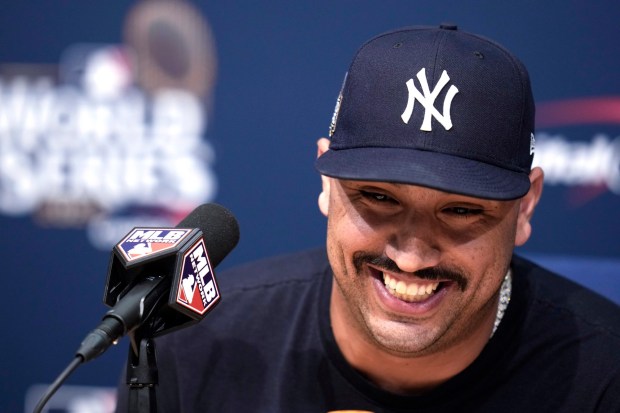 New York Yankees pitcher Nestor Cortes answers a question during a news conference before Game 1 of the baseball World Series, Friday, Oct. 25, 2024, in Los Angeles. (AP Photo/Julio Cortez)
New York Yankees pitcher Nestor Cortes answers a question during a news conference before Game 1 of the baseball World Series, Friday, Oct. 25, 2024, in Los Angeles. (AP Photo/Julio Cortez)
Your velocity isn’t the highest, you’re not the tallest, but you do something that’s often overlooked in today’s game: You pitch. There’s finesse. You vary your arm angles, grips, timing and delivery. How much pride do you take in your craft?
A: I do take a lot of pride in that, actually. People ask me all the time — I mean, I’ve asked myself at times too — I’m like, ‘How did I just throw six innings versus a top offense or a team that’s hot?’ And then you look back at the outing, it’s like, ‘Wow. I basically was an artist out there.’ Like, you threw that pitch where you needed to throw it in that situation. And then you were able to give yourself a little bit more room in the zone because of how you set (a pitch) up. … I think it is lost, but I think it’s coming back a little bit. People buy into the analytics, which I love. I’m for analytics, but you got to buy into the feeling of the game. And I think that was lost a little bit, but I think it’s coming back.
When you were struggling with the Mariners, Rob Marcello, your Triple-A pitching coach, helped you change your grip on your fastball. Why was that little tweak so impactful?
A: So for me, I have a four-seam fastball. Basically, (the ball is) on a clock. If I’m spinning my ball (at 10:45), I don’t get ride on my fastball. If I tilt it just to 11:15, 11:30, that allows me to ride the ball a little longer through the zone. And that little adjustment for me was incredible. Because I said, ‘Rob, I was so good as a minor leaguer. Why? Explain to me why.’ He’s like, ‘Let’s look at the computer.’ And the first thing that pumped out was 10:45 to 11:15. Like, ‘Hey, try and spin the ball at 11:15.’ As soon as I did that, everything just skyrocketed after that.
That story is incredible to me because what if you hadn’t crossed paths with him or asked him for help? I mean, maybe another pitching coach would catch it, but…
A: Exactly. Maybe. But maybe not.
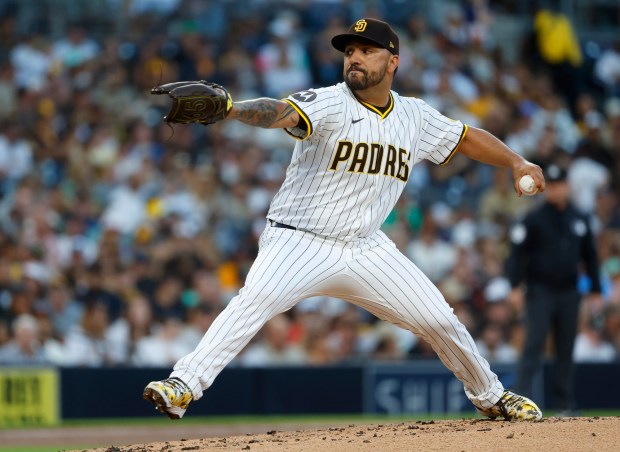 Nestor Cortes #65 of the San Diego Padres pitches against the San Francisco Giants at Petco Park on Aug. 18, 2025 in San Diego, California. (K.C. Alfred / The San Diego Union-Tribune)
Nestor Cortes #65 of the San Diego Padres pitches against the San Francisco Giants at Petco Park on Aug. 18, 2025 in San Diego, California. (K.C. Alfred / The San Diego Union-Tribune)
You’re someone who has had to prove yourself repeatedly just to get an opportunity. What have you learned about yourself through your journey?
A: I think you’ve got to take your career day by day. You’ve just got to live, I think, in the moment. Almost have the mentality of how you’re going to survive today. Like I said, from ’18 to ’20, it was tough. It was tough to overcome each day, because I was always thinking of ahead, ahead, ahead. Where now it’s like, get one pitch strike, get second pitch strike, get first out, get second out, and from there go inning by inning.
Do you have any hobbies?
A: I love fishing. My dad has always owned a boat since I can remember. My grandfather was a fisherman in Cuba, so that’s how my dad got into the whole fishing side. Once we got to Miami, I remember my dad always trying to work and trying to save up some money to buy his small boat and be able to go out there and fish. I kind of gravitated towards that. I love the water. I love being on the boat. I love fishing. I actually enjoy my time in the offseason with him, because we both fish together. We go out and that’s how we do our father-and-son time. I’m gonna check out the fishing (in San Diego), for sure.
Speaking of father and son bonding, you are a new dad to Nestor III, who was born in May. How do you like fatherhood?
A: Incredible. I used to always make fun of my friends, like, they take too many pictures or show me their sons so many times. And I’m like, ‘Dude, I get it. You’re a dad.’ But now that I’m a dad, I find myself taking pictures and sending pictures, and I’m like, ‘Man, I thought I was never gonna be this guy.’ And here I am, like, ‘Look how big he is. Look, this is a week ago, this is now.’ I enjoy it. My wife is here, my son is here, so I love going back to them and just hanging out with him. Obviously, these early stages, they change from one week to the other. She gave birth in Miami and wasn’t able to travel for six weeks to Milwaukee, so I didn’t have him for these first six weeks. And at first when he got there, I was like, ‘I know he’s my son, but we don’t have that (bond) yet.’ So it was kind of like, I wouldn’t say weird, but it was just not that lovey-dovey stuff. And as soon as two, three weeks went by, it was like, ‘Holy crap. I’m a dad.’
One day he will learn about Nasty Nestor and his mustache. Is that your alter ego now?
A: Fans gave me that nickname in New York. This was probably the end of 2021 into 2022. And then with the All-Star year in ’22, it kind of stuck. So after 2022, I was like, ‘You know what, not a lot of people could be named Nasty Nestor and it be a good thing.’ So I (got it tattooed) on (my wrist). I just think it’s a pretty cool nickname to have. And I guess once you have a nickname in the big leagues, it means you made it. And the mustache (turned into) my superpower.
Last year’s World Series didn’t end the way you wanted it to, but did going through that change you?
A: Definitely. I think going into the postseason and getting to the World Series, it gives you a different type of personality and a different kind of bond with your teammates. Because now it’s like, ‘Dude, we’ve been through it all. We’ve grinded for 162 (games)’ and now we have this month where we’re striving to be the best team in the world. We’re obviously after one mission, one goal, and it is to win the World Series. So I think going through that kind of puts perspective into life too. You create friendships that are forever.
Anything you want to see or do in San Diego?
A: I’ve heard there’s a huge Navy base here, so I would love to check that out. Obviously, the work that they put in every single day, it’s just amazing. And then, I want to fish here. I’ve never been tuna fishing. I heard this is a really good tuna fishing spot, and I want to be able to fight with one of those for an hour or two.
